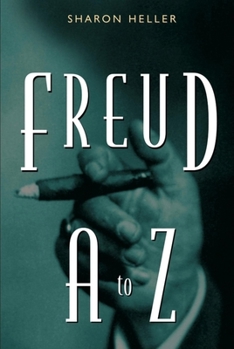Freud A to Z
Select Format
Select Condition 
Book Overview
A lively guide to the life and work of the father of psychoanalysis From Anna O. to Zionism, this uniquely accessible A-to-Z reference presents a comprehensive overview of Freud's ideas, family,... This description may be from another edition of this product.
Format:Paperback
Language:English
ISBN:0471468681
ISBN13:9780471468684
Release Date:March 2005
Publisher:Trade Paper Press
Length:256 Pages
Weight:0.70 lbs.
Dimensions:0.7" x 6.6" x 9.1"
Customer Reviews
2 ratings
Enthusiastic, Informative and Short...
Published by Thriftbooks.com User , 18 years ago
Sharon Heller has created a new type of biography, a cross-referenced kind of lexicon on an extremely complex subject. The great minds of the twentieth century are vast and varied. Freud has to be one of the most influential intellectuals of the last century in terms of our popular culture today, most likely more prevalent than any other writer. Einstein's theory of the universe and his popular protests against war made this man extremely popular, but his popularity was based on what Charlie Chaplin said, (paraphrased) "They love you because no one understands you. They love me because they all understand me." Albert Schweitzer showed us what a good mind and a genuine willingness to help other misfortunate people can do to improve the planet; Mother Theresa took this notion further, showing the world the core of Christian belief; Crick revealed DNA and Oppenheim made the first nuclear bomb, using the explosive to destroy two cities in Japan. The twentieth century will be remembered as the century of technological advancement like no other in our relatively short recorded history. What is interesting, however, is that Sigmund Freud and his theories, despite losing popularity during its reign; many noteworthy psychologists, psychiatrists, in present day, continue to quote his theories, because Freud managed to do something important. He popularized the notion of the unconscious; that our conscious actions are not necessarily motivated on conscious grounds; our intentions, our `true' incentive could well be driven by our unconscious (unknowable) drives, our mind in constant conflict...a will (drive) to create (sex) and a will to destroy (death). One of my favourite short texts by Freud, written shortly after the First World War is "Civilization and its Discontents", describing the Death Instinct persuasively. Heller manages to succinctly, in alphabetical format, explain most of Freud's general theories...thought by most to be an impossible task in such a short text. One can feel Heller's enthusiasm and admiration for her subject. She writes clearly and her fascination on her subject is apparent, thus, as an old fan of the cigar smoking genius, this text is a pleasure to read. At this point in time, have not decided whether the text is a good reference for students, (too much history, not enough theory) but it is surely a wonderful starting point as a simple beginning to Freud's theories and the man himself for anyone interested or curious. A good text for the beginner and something entertaining for the informed reader as well. 4 stars
Attractive Freud easy to understand
Published by Thriftbooks.com User , 19 years ago
This compilation is the most pleasurable reading I found about Freud yet. Presuming it is accurate it's A to Z topics are easy and interesting adding information about the man, theory and events related. Maybe you are a specialist but I am certain that you find something you don't know and would like to know.






